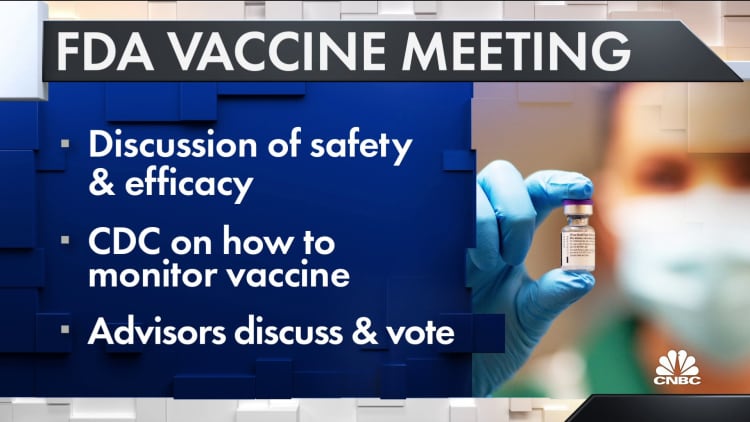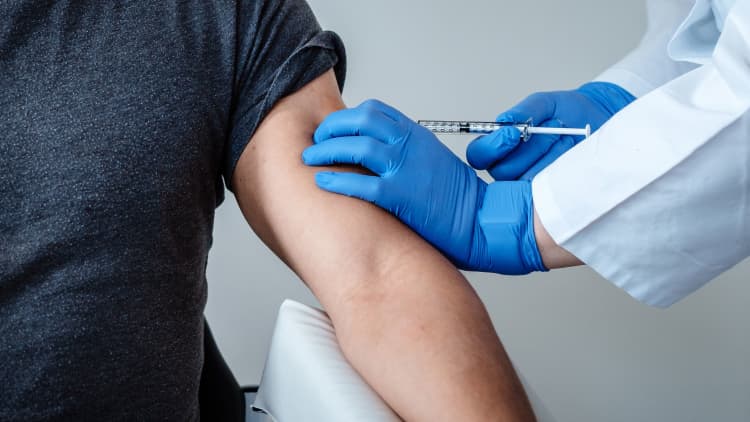The Pfizer-BioNTech coronavirus vaccine is both safe and effective, according to the U.S. Food and Drug Administration. In a report released Tuesday morning, the FDA indicated that it could greenlight the country’s first Covid-19 inoculation within days.
If Pfizer’s shot is granted an emergency use authorization, or EUA, the immunizations — which are administered in two doses about three weeks apart — could start as soon as next week.
Many people are now wondering whether this will be just like getting the flu vaccine.
The short answer is: No, not really.

One Pfizer trial participant told CNBC that after the second shot, he woke up with chills, shaking so hard he cracked a tooth. "It hurt to even just lay in my bed sheet," he said.
Others experienced headaches and fatigue.
The FDA said that while side effects of the Pfizer vaccine are common, there are “no specific safety concerns identified that would preclude issuance of an EUA.”
Be prepared for the second shot
The Pfizer vaccine is one of four U.S.-backed candidates in phase three trials. Next up is one from U.S. biotech firm Moderna, which has also submitted its EUA application.
Both companies have said that taking their vaccines could result in side effects similar to mild Covid symptoms. Think muscle pain, chills and a headache.
When trial participant Yasir Batalvi first read Moderna’s 22-page consent form warning of side effects ranging from nothing at all to death, he felt pretty worried, he told CNBC.
“You have to keep in mind, I joined the trial when we didn’t know it was going to be a safe vaccine,” said Batalvi, a recent college graduate living in Boston.
The 24-year-old said that when he got the first injection in mid-October, it felt just like a flu shot. “I experienced stiffness and pain in my left arm where I had gotten the shot, but it was mild,” he explained. “By that evening, I didn’t want to move my arm above my shoulder, but it was localized, and it disappeared by the next day.”
The second dose was a different story.
“After the injection, I had the same side effects as the first: localized pain and stiffness, but it was a little bit worse. My arm got sore faster, and by the time I got home, I started feeling fatigued and like anyone would feel if they were coming down with the flu,” said Batalvi.
More significant symptoms presented that evening. “I developed a low-grade fever and had chills,” he said. “That evening was rough.”
I developed a low-grade fever and had chills. That evening was rough.Yasir BatalviModerna trial participant
After a restless night, he called the study doctors, who reassured him it was a normal reaction and no cause for concern. By that afternoon, Batalvi said, he felt like himself again.
Moderna stopped testing the highest dose of its vaccine during the trial because of the number of reports of severe adverse reactions.
As for any long-term effects, Batalvi isn’t giving it much thought. “I’m not too concerned," he said. "We know from vaccination trials that any adverse events mostly show up in the first couple of months.”
How an mRNA vaccine works
Front-runners Pfizer and Moderna built their candidates with a new kind of technology that’s never before been licensed in the U.S.
Messenger RNA vaccines, called mRNA for short, aren’t like your normal flu vaccine. Typically, a vaccine puts a weakened or inactivated virus into our bodies to trigger an immune response, which then produces antibodies. Those antibodies are what ultimately protect us from getting infected if we ever encounter the real thing.
An mRNA vaccine, on the other hand, is essentially just a piece of genetic code that contains instructions for our body. The mRNA tells our cells to make a protein — the same protein that is the spike on top of the actual coronavirus. This is what triggers the immune response in these types of vaccines.
So even though some trial participants reported Covid-like symptoms, it is impossible to contract the coronavirus from the vaccine, because the mRNA vaccines that Pfizer and Moderna are making don't use the live virus.
Dr. Hana El Sahly, who oversees a clinical trial for Moderna’s vaccine candidate, said one major benefit of the mRNA technology is how fast it is to make. “The attractiveness of it is the speed with which it can be manufactured once we know the sequence of the virus,” said El Sahly.
With the traditional flu vaccine, you have to first grow the virus in an egg, then deactivate the virus, and finally, put it into vaccine vials with either mRNA or recombinant DNA technology, explained El Sahly.
The Covid vaccine’s faster manufacturing timeline is key, as distributors look to expedite distribution to the U.S. population.
Paying for the vaccine
Also key to widespread vaccination is making sure governments around the world have enough money to buy the vaccines.
Moderna said in August it is charging between $32 and $37 per dose for its vaccine and would perhaps offer a discount if it is bought in bulk. Pfizer's, on the other hand, is more affordable. It is reportedly $20 per dose.
The U.S. has secured 100 million doses of the Pfizer vaccine, which is enough to vaccinate 50 million people.
But to achieve herd immunity, experts say, roughly 70% of the population needs to be vaccinated or have natural antibodies. That's about 462 million doses for herd immunity and an estimated 660 million doses for everyone in the country.
Pfizer board member Dr. Scott Gottlieb told CNBC on Tuesday that President Donald Trump declined the company's offer to buy additional doses.
A debate over unblinding the control group
Both Pfizer and Moderna are conducting double-blind trials, which means that half the participants receive a placebo and the other half receive the actual vaccine. Because the trials are ongoing, it also means that patients don’t know which group they are in.
There is a debate raging among experts about whether to give the control group the vaccine.
The FDA isn’t too keen on the idea of dosing the placebo group, while some scientists are making the case that they should be moved higher on the prioritization list as a thanks for their service.
But this kind of break in trial protocol would interfere with the integrity of the trial, so for now, participants such as Batalvi remain in the dark as to whether they’re actually protected against the virus. A person can still present symptoms, as Batalvi did, even if they are in the control group. It's the "placebo effect."
But either way, Batalvi said he's glad he had the opportunity to participate in an effort to protect the world against the pandemic.



